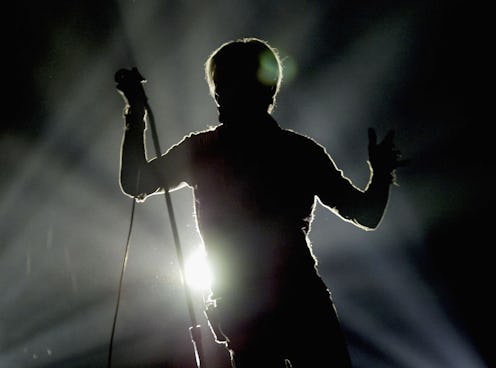Iconic artist and musician David Bowie transformed pop music into a dynamic, complex art form over the course of a career that spanned four decades. Like the music he wrote and performed, the man was a revolving kaleidoscope of personas and styles. Whether he was Ziggy Stardust, Aladdin Insane, or the Thin White Duke, the dramatic performer was transformative. On Sunday, just days after releasing his new album Blackstar, David Bowie passed away and left behind a career that will eternally influence the music world.
Fittingly, his latest album, which was recorded alongside a myriad of other musicians, ends with the track "I Can't Give Everything Away." Like a true artist, Bowie has effectively externalized his inner state by creating something tangible that the world can hear and attribute meaning to. Producer and Blackstar collaborator Tony Visconti explains Bowie's intention to CNN.
But what he gives away is what he writes about. I think a lot of writers feel like, 'If you want to know about me, just study my lyrics.' That's why he doesn't give interviews. He's has revealed plenty in past interviews, but I think his life now is about his art. It's totally about what he's doing now.
In honor of that art, here's a look at just some of David Bowie's best hits that showcase his remarkable diversity and creativity.
"Space Oddity" (1969)
The promotional video depicts young David Bowie as Major Tom, Ground Control, and the Countdown Announcer. The superimpositions of Bowie's face inside of the fisheye frame in multicolored filters adds a necessary degree of avant-garde trippy-ness that beautifully counteracts Ground Control's exaggerated, almost silly facial expressions. Basically, if you love the song, the video will make you love it even more.
"Unwashed and Somewhat Slightly Dazed" (1969)
This track, which immediately follows "Space Oddity," was the first to be produced by Tony Visconti, the man who also produced Bowie's last album Blackstar.
"Life On Mars?" (1971)
Equipped with a dramatic ballad-like chorus, this song inspires the performer's heart. During the 60s and 70s, Bowie's eccentric style was completely unique, and still is. The song's surrealist undertones prompted BBC Radio 2 to describe it as "a cross between a Broadway musical and a Salvador Dalí painting." Jessica Lange sang this number for a reason on American Horror Story: Freak Show, giving her television audience chills.
"Changes" (1971)
He warns, "Oh, look out all you rock 'n rollers." He was out to change the game and didn't have to join the mainstream to succeed in doing so.
"Andy Warhol" (1971)
Bowie inspired millions, and this song is dedicated to the renowned pop artist that inspired him. The acoustic nature of the song along with the experimental introduction during which Bowie asks if the tape is rolling contributes intimacy to the track. The same year, after he had already written the song, Bowie met Warhol ... who then proceeded to take a polaroid of the singer's shoes. According to Rolling Stone, Warhol hated the song.
"Starman" (1972)
Like the "Starman" who was supposed to deliver salvation to Earth, Bowie was unarguably ahead of his time in the music world. He conjured his alternate persona "Ziggy Stardust" and an entire background story for the alter-ego in his fifth album The Rise and Fall of Ziggy Stardust and the Spiders from Mars.
"Fame" (1975)
Bowie wrote this song after having a long discussion with John Lennon about the incompatibility between management and rock 'n roll. From that point on, Bowie rejected the idea of signing himself off to an individual. Instead, he hired separate individuals for specialized jobs.
"Stay" (1976)
The funky bassline-driven track exemplifies Bowie's diversity and ability to mix genres such as rock 'n roll and funk or jazz.
"Warszawa" (1977)
The instrumental song is composed using eerie synths and melancholic organs and was produced alongside Brian Eno.
"Let's Dance" (1983)
The irresistible track is the second and last of Bowie's to reach number one on the American Billboard charts in the days following chart-toppers such as Michael Jackson's "Billie Jean" and Dexys Midnight Runners' "Come On Eileen."
"Hallo Spaceboy" (1995)
This song, which was released during Bowie's less-successful career stretch, is intriguingly cacophonous. He sings, "this chaos is killing me"— the harsh bass, distorted guitar riffs, and major electronic dance influence reflects just that.
"Blackstar" (2016)
The title track of his last album precedes others such as "Lazarus" — the Biblical figure who rose from the dead — and "I Can't Give Everything Away." The album doubles as an enigmatic goodbye from Bowie himself.
